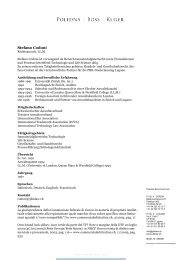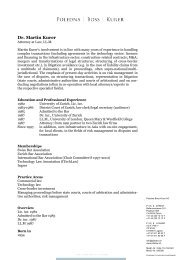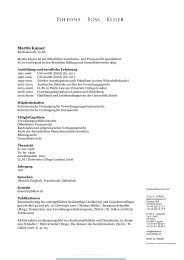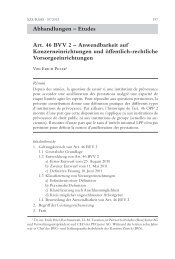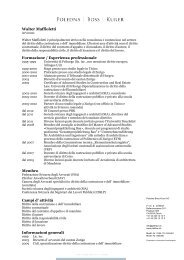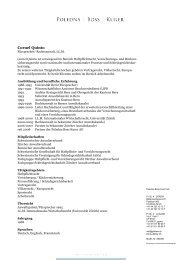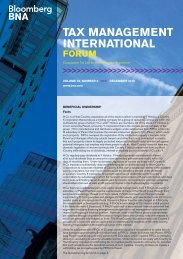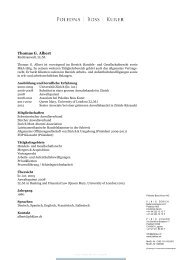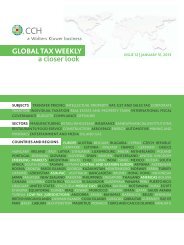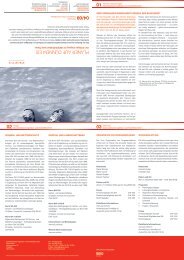THEESTER'S COLUMNISSUE 30 | JUNE 6, 2013Dateline June 6, 2013For a long time it has seemed that CARICOM, thegrouping of Caribbean states including such relativelylarge territories such as The Bahamas, Haitiand Jamaica as well as minnows like Montserrat,is nothing but a talking shop without the will oreven the technical skills to achieve its stated goalof economic and political integration. But therehave been some signs recently that it may be gettingmore serious. This week it signed a TIFA withthe US , which will presumably act as a stimulusto some sort of local harmonization of standards,laws and taxes. Then, seven WTO members of subgroupingthe OECS (the Organization of EasternCaribbean States) which could be said to havemade better progress towards at least economicunification, with a shared currency and centralbank, are to undergo a trade policy review by theWTO, which will doubtless be thoroughgoing andproductive. These are good signs; but more generally,progress towards the CSME (Caribbean SingleMarket and Economy), which is the name given toCARICOM's intended shared economic space, hasbeen fairly glacial. We will see, but I'm not holdingmy breath.A cheer for UK Chancellor George Osborne whosays that he will square the country's budgetarycircle in 2015 with savings from government departmentsrather than by increasing taxes. I don'tknow what the Treasury gave visiting IMF officialsto drink two weeks ago, but it must have beensomething quite strong with pixie dust mixed inbecause just for once the IMF didn't suggest raisingtaxes, and broadly supported the coalition's stance.I say "the coalition," but minority partner theLibDems are facing electoral wipe-out, damagedperhaps beyond repair by the very fact of joiningthe coalition, in which they have had to supportan economic program that is the exact converse ofeverything they have ever preached. It's wonderfulwhat power does to people's sense of judgment.The Tories probably have little to fear from the Lib-Dems in the next election, and Labour is sinkingunder the weight of another feckless leader. Youwould have thought they had learned the lessons ofMichael Foot and Neil Kinnock, but no – and theyhave a serious funding crisis to deal with as well.The Tories' problem is the burgeoning UKIP (UKIndependence Party) which is supported by a pluralityof the UK population in wanting to leave theEU. If UKIP can manage to shed its unpleasantlyracist fringe, a Tory/UKIP government becomesa real possibility, and then there would be a referendumon EU membership by 2018, with a fairlypredictable result.I may have to admit that I was wrong in sayingthat the Spanish Government was all talk and nowalk. Its latest package of support for small businessis practical and significant, giving substantialencouragement to people to start and/or invest inbusinesses. Presumably it has been cleared withBrussels, but if not, it wouldn't be the first time98
that Spain has gone its own way first and lookedfor approval afterwards. It's also not quite clearwhether the new measures are consistent with theGovernment's stability program announced at theend of April, which sees a deficit of 6.3 percent ofgross domestic product this year (revised upwardsrecently from 4.5 percent), 5.5 percent in 2014,4.1 percent in 2015, and of 2.7 percent in 2016.Those numbers are in line with the Commission'sdeficit targets for Spain, although only because theEU, bowing to the inevitable, announced this weekthat Spain (and France) would be given an extratwo years to reach their fiscal targets. It's difficultto see how even these latest targets can be reachedwithout significant savings; let's hope that PrimeMinister Rajoy takes a leaf out of Britain's book.Challenging as it is, the only way of saving Europeis to cut bloated state sectors, and cut them hard.We can't give the EU Commission any browniepoints for abandoning the financial transactions taxin its current form – given the barrage of oppositionfrom politicians, the financial sector in general,several unincluded member states, and even fromsome of the prospective members of the "variablegeometry" eleven, it had no choice. In fact we'llgive it a black mark for leaking the information viaReuters rather than announcing it. Too shameful,presumably, after it had staked so much on the tax.Heads would roll, if the EU was a properly transparentpolitical space, but it isn't, and there will bea long process of face-saving before the tired oldanimal is finally led to the knacker's yard. In thiscolumn we have been strongly against the tax fromthe very beginning. Officially, the Commission isstill pretending that the tax is merely "under discussion,"but I prefer to believe the leaks!Australia had a very successful week in its campaignto drive multinational businesses out of the country.Assistant Treasurer David Bradbury said thatreforms to increase fiscal transparency form "partof the Government's broader agenda to crack downon multinationals." No, OK, he didn't say that, althoughhe just as well might have said it. What heactually said was " . . . . to crack down on multinationalprofit shifting and tax avoidance." Yawn. Earlierin the week he had delivered a stinging diatribeagainst the habits of multinationals , calling them"massive money shuffles." He screeches that companiesobtain "a competitive advantage" – how awful!Isn't that exactly what they're supposed to do?And naturally he complains that "families" are leftto foot the bill. Well, Mr. Bradbury, what about thejobs those families live from, and the income taxesand GST etc etc your Government receives courtesyof those jobs? He's only 37, by the way, andwas a tax lawyer with a major commercial law firmfor some years before being elected to parliament in2007. He was twice mayor of Penrith. Impressive.I may be wrong (often am!) but I am suspicious ofthe Dutch Government's plan to replace corporateapprenticeship tax breaks with "targeted subsidies,"because it seems to take decisions out of the handsof companies and puts power to dish out moneyin the hands of officials. It's not that I would suspectDutch officials of venality – I am sure that99
- Page 1 and 2:
GLOBAL TAX WEEKLYa closer lookISSUE
- Page 3 and 4:
GLOBAL TAX WEEKLYa closer lookISSUE
- Page 5 and 6:
FEATURED ARTICLESISSUE 30 | JUNE 6,
- Page 7 and 8:
taxation treaties concluded by Swit
- Page 9 and 10:
FEATURED ARTICLESISSUE 30 | JUNE 6,
- Page 11 and 12:
FEATURED ARTICLESISSUE 30 | JUNE 6,
- Page 13 and 14:
UK, its offshore dependencies, and
- Page 15 and 16:
financing and all forms of financia
- Page 17 and 18:
Th e Government pointed out in part
- Page 19 and 20:
Talks are now underway. The TIEA wi
- Page 21 and 22:
through which they can clamber in o
- Page 23 and 24:
fi nally, and most egregiously, the
- Page 25 and 26:
office space, or own tangible asset
- Page 27 and 28:
extended for 2 years in December 20
- Page 29 and 30:
Financial transactions ( e.g. inter
- Page 31 and 32:
OECD Section E - Redraft On Safe Ha
- Page 33 and 34:
suggests that the following items m
- Page 35 and 36:
FEATURED ARTICLESISSUE 30 | JUNE 6,
- Page 37 and 38:
State Interest And IntangibleExpens
- Page 39 and 40:
States generally define "intangible
- Page 41 and 42:
Code Sec. 1563(controlledgroup)Stat
- Page 43 and 44:
ConnecticutGeorgiaIllinoisIndianaRe
- Page 45 and 46:
Rhode IslandTennesseeVirginiaWest V
- Page 47 and 48: Table 4. Comprehensive Income Tax T
- Page 49 and 50: include federal interest income, st
- Page 51 and 52: Recurring IssuesRestructuring of th
- Page 53 and 54: M&A. Nick has extensive experience
- Page 55 and 56: and consumers." As Germany and Chin
- Page 57 and 58: on many levels. The panel found tha
- Page 59 and 60: equirements placed on the states, i
- Page 61 and 62: NEWS ROUND-UP: COUNTRY FOCUS - ITAL
- Page 63 and 64: NEWS ROUND-UP: REAL ESTATE AND PROP
- Page 65 and 66: ates - such that, in 2014, the 4 pe
- Page 67 and 68: NEWS ROUND-UP: FTTISSUE 30 | JUNE 6
- Page 69 and 70: NEWS ROUND-UP: ENVIRONMENTAL TAXESI
- Page 71 and 72: Finally, the Federal Council veheme
- Page 73 and 74: Singapore Plugs Benefits For SMEsOf
- Page 75 and 76: TAX TREATY ROUND-UPISSUE 30 | JUNE
- Page 77 and 78: CONFERENCE CALENDARISSUE 30 | JUNE
- Page 79 and 80: Key speakers: John Capasso (Alvarez
- Page 81 and 82: Key speakers: TBA6/27/2013 - 6/27/2
- Page 83 and 84: 6/14/2013 - 6/14/2013http://www.con
- Page 85 and 86: THE CYPRUS BAIL-OUT ANDFOREIGN CLIE
- Page 87 and 88: Chair: Jonathan Levy (Partner, Reyn
- Page 89 and 90: IN THE COURTSISSUE 30 | JUNE 6, 201
- Page 91 and 92: on including the profit from the do
- Page 93 and 94: deduct VAT as a result of incomplet
- Page 95 and 96: where the taxpayer had somehow offs
- Page 97: een paid in the destination State.



